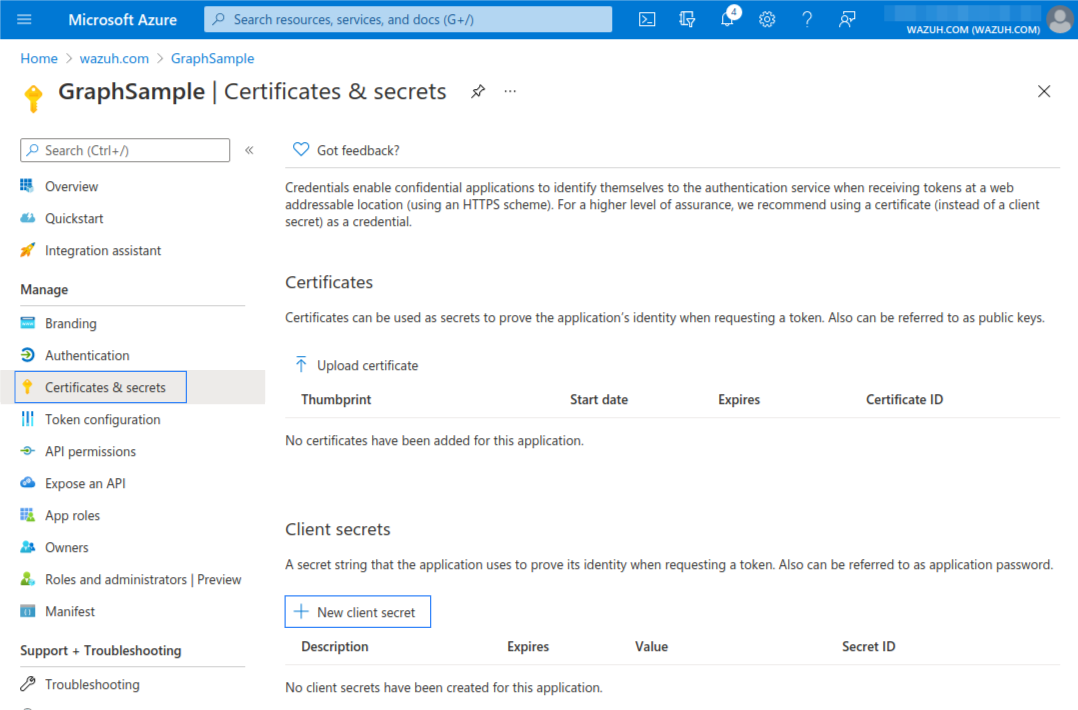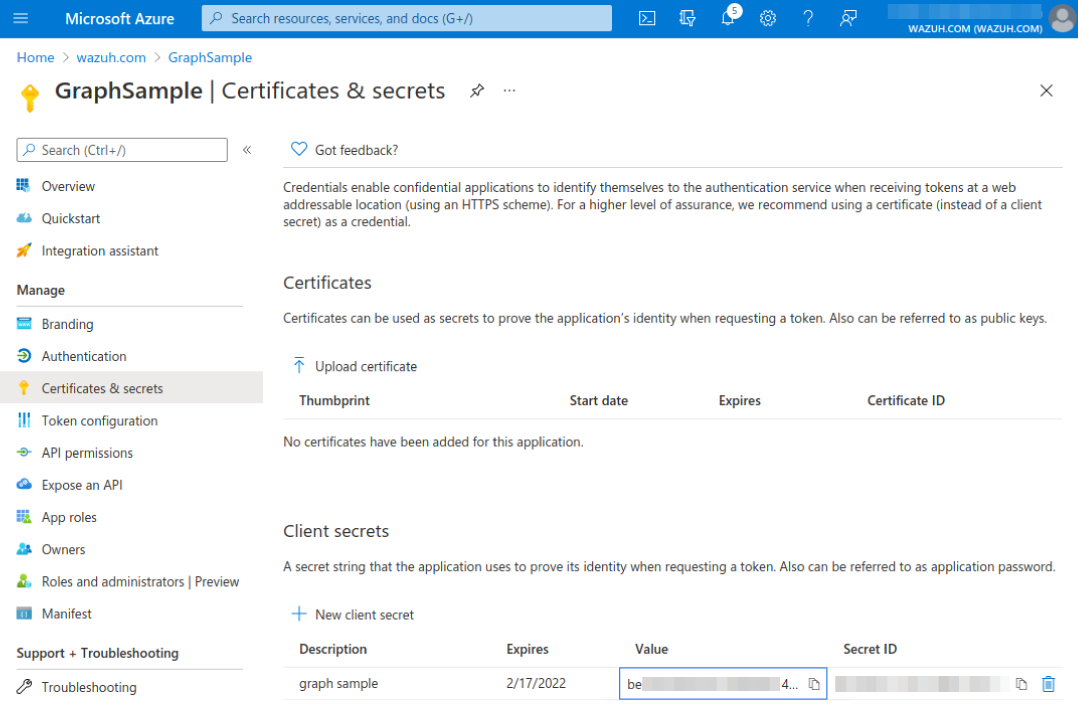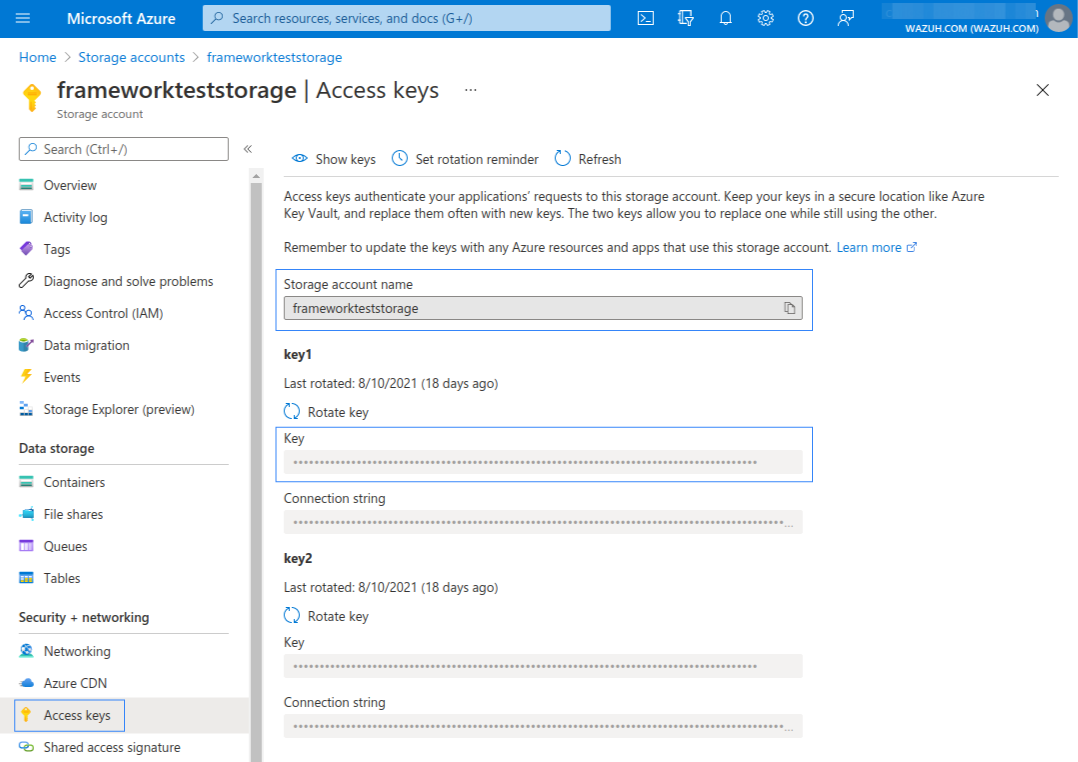Configuring Azure credentials
It is necessary to provide access credentials to the Wazuh Azure module so it can successfully connect to Azure. The credentials required vary depending on the type of monitoring.
Getting access credentials for Microsoft Graph and Log Analytics
For Microsoft Graph and Log Analytics valid application_id and application_key values are required. The necessary application_key value for a given App Registration in Microsoft Entra ID can be obtained from the Certificates & secrets section while the application_id can be obtained from the Overview section:


Getting access credentials for Storage
Azure Storage requires valid account_name and account_key values. They can be obtained in the Access keys section of Storage accounts:

Authentication options
There are two different ways to set up the Azure authentication:
Using an authentication file
It is possible to store the credentials in a file for authentication as long as the file content follows the field = value format explained below.
The fields expected to be present in the credentials file will change depending on the type of service or activity to be monitored.
Microsoft Graph and Log Analytics
The file must contain only two lines, one for the application ID and another one for the application key obtained previously.
application_id = <YOUR_APPLICATION_ID>
application_key = <YOUR_APPLICATION_KEY>
Storage
The file must contain only two lines, one for the account name and the other one for the account key obtained previously:
account_name = <YOUR_ACCOUNT_NAME>
account_key = <YOUR_ACCOUNT_KEY>
Regardless of the service or activity to be monitored, the authentication file is always specified in the ossec.conf configuration file using the <auth_path> tag. Take a look at the following example:
<wodle name="azure-logs">
<disabled>no</disabled>
<run_on_start>yes</run_on_start>
<log_analytics>
<auth_path>/var/ossec/wodles/credentials/log_analytics_credentials</auth_path>
<tenantdomain>wazuh.onmicrosoft.com</tenantdomain>
<request>
<query>AzureActivity</query>
<workspace>d6b...efa</workspace>
<time_offset>1d</time_offset>
</request>
</log_analytics>
<graph>
<auth_path>/var/ossec/wodles/credentials/graph_credentials</auth_path>
<tenantdomain>wazuh.onmicrosoft.com</tenantdomain>
<request>
<query>auditLogs/directoryAudits</query>
<time_offset>1d</time_offset>
</request>
</graph>
<storage>
<auth_path>/var/ossec/wodles/credentials/storage_credentials</auth_path>
<container name="insights-operational-logs">
<blobs>.json</blobs>
<content_type>json_inline</content_type>
<time_offset>24h</time_offset>
</container>
</storage>
</wodle>
Check the azure-logs wodle section from the ossec.conf reference page for more information about the <auth_path> and other available parameters.
Inserting the credentials into the configuration
Deprecated since version 4.4.0.
Another authentication option is to set up credentials by storing them directly into the Wazuh configuration file /var/ossec/etc/ossec.conf, inside of the <graph>, <log_analytics> and <storage> blocks on the module configuration.
The tags to use are different depending on the type of service or activity to be monitored:
Microsoft Graph and Log Analytics
<wodle name="azure-logs">
<disabled>no</disabled>
<run_on_start>yes</run_on_start>
<log_analytics>
<application_id>8b7...c14</application_id>
<application_key>w22...91x</application_key>
<tenantdomain>wazuh.onmicrosoft.com</tenantdomain>
<request>
<query>AzureActivity</query>
<workspace>d6b...efa</workspace>
<time_offset>1d</time_offset>
</request>
</log_analytics>
<graph>
<application_id>8b7...c14</application_id>
<application_key>w22...91x</application_key>
<tenantdomain>wazuh.onmicrosoft.com</tenantdomain>
<request>
<query>auditLogs/directoryAudits</query>
<time_offset>1d</time_offset>
</request>
</graph>
</wodle>
Storage
<wodle name="azure-logs">
<disabled>no</disabled>
<run_on_start>yes</run_on_start>
<storage>
<account_name>exampleaccountname</account_name>
<account_key>w22...91x</account_key>
<container name="insights-operational-logs">
<blobs>.json</blobs>
<content_type>json_inline</content_type>
<time_offset>24h</time_offset>
</container>
</storage>
</wodle>
Take a look at the azure-logs wodle entry from the ossec.conf reference page for more information about the parameters.